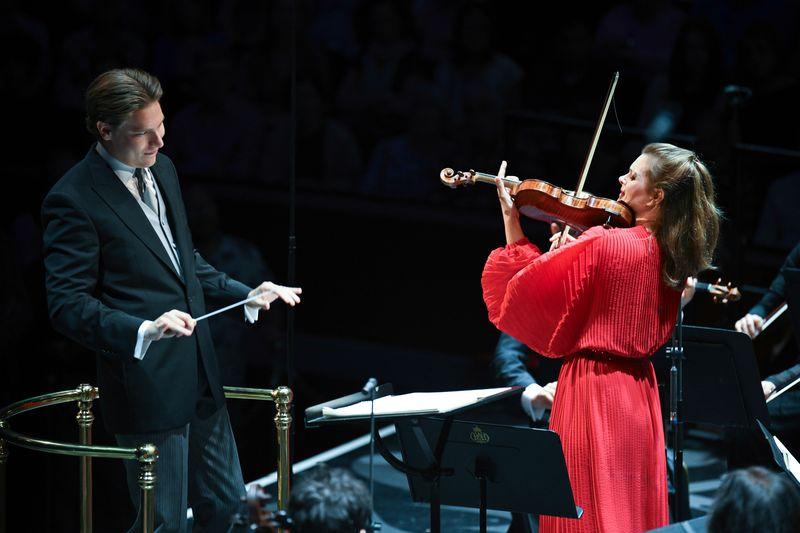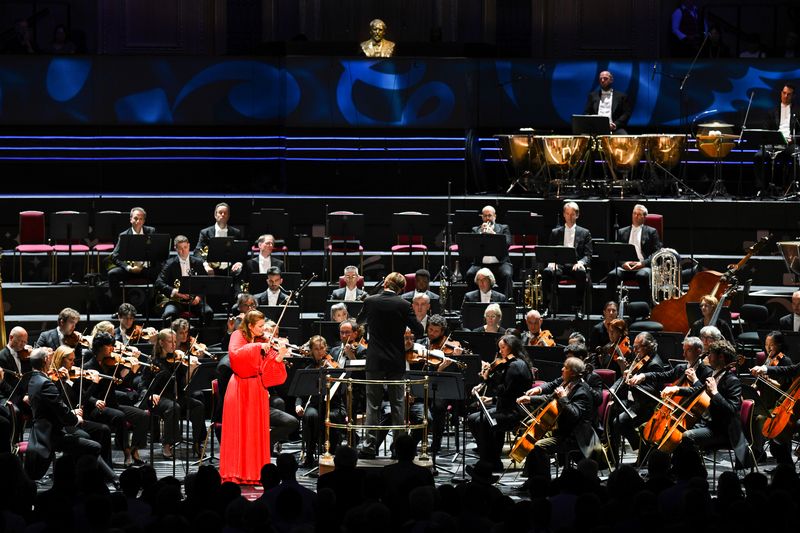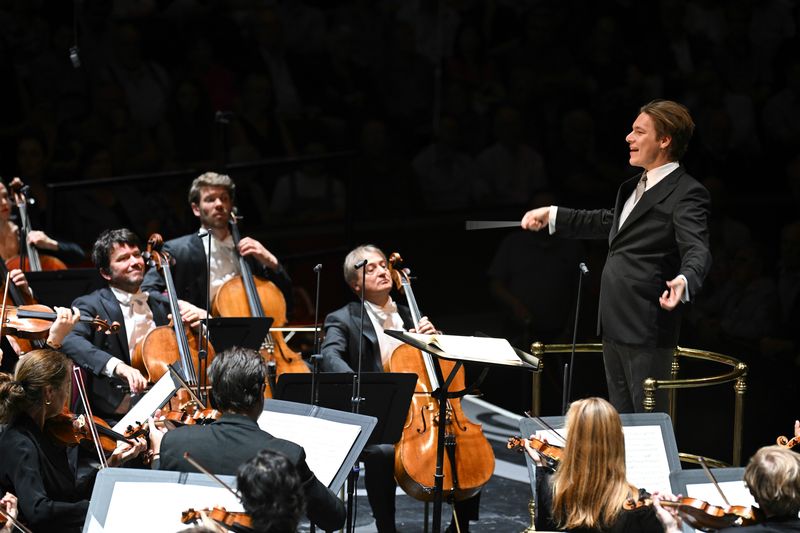BBC Proms: Jansen, Royal Concertgebouw Orchestra, Mäkelä review - confirming a phenomenon | reviews, news & interviews
BBC Proms: Jansen, Royal Concertgebouw Orchestra, Mäkelä review - confirming a phenomenon
BBC Proms: Jansen, Royal Concertgebouw Orchestra, Mäkelä review - confirming a phenomenon
Second Prom of a great orchestra and chief conductor in waiting never puts a foot wrong

How often is an orchestral concert perfect in every texture, every instrumental entry, every phrase? Wednesday's Phiharmonia Prom struck sound-spectrum gold, but its chief conductor, Santtu Matias Rouvali, could do with more humanity. My colleague Rachel Halliburton found his fellow Finn Klaus Mäkelä challenging in Mahler’s Fifth on Saturday night, but on Sunday afternoon neither he nor his fellow musicians put a foot wrong; indeed, feet hardly seemed to touch the ground.
Mozart might have been a style challenge for the Royal Concertgebouw Orchestra's chief conductor elect, most familiar in late romantic works, but the "Paris" Symphony which began the Sunday afternoon concert was elegant, clear-textured, hypersensitive to a range of dynamics. which rendered the instant slips from jubilant major into thoughtful minor align the work with the later symphonic masterpieces, 38-41. To draw every outline in the tricky space of the Albert Hall was not the least of Mäkelä's achievements here.  His partnership with the arguably the greatest, certainly the most communicative violinist of our time, Janine Jansen - for me she's first equal with Vilde Frang - has been well established on a superlative CD featuring Sibelius's Violin Concerto and Prokofiev's First. In the hall, you had to strain to catch the shimmer of strings and the ethereal melody which begin and end the Prokofiev (did the composer establish a first in ending a concerto that way?). Which is as it should be. Jansen made even more of the work than usual sound like fairy music by Mendelssohn - "Mendelssohnism" was a negative tag at the time of the concerto's first performance in 1920s Paris, but it could hardly seem so here - with Caliban joining Ariel only in the whirlwind scherzo. Jansen tuned in to the exquisite Concertgebouw first flute, Emily Beynon, her collegial ear always fine tuned, as it must be in this other-worldly masterpiece.
His partnership with the arguably the greatest, certainly the most communicative violinist of our time, Janine Jansen - for me she's first equal with Vilde Frang - has been well established on a superlative CD featuring Sibelius's Violin Concerto and Prokofiev's First. In the hall, you had to strain to catch the shimmer of strings and the ethereal melody which begin and end the Prokofiev (did the composer establish a first in ending a concerto that way?). Which is as it should be. Jansen made even more of the work than usual sound like fairy music by Mendelssohn - "Mendelssohnism" was a negative tag at the time of the concerto's first performance in 1920s Paris, but it could hardly seem so here - with Caliban joining Ariel only in the whirlwind scherzo. Jansen tuned in to the exquisite Concertgebouw first flute, Emily Beynon, her collegial ear always fine tuned, as it must be in this other-worldly masterpiece.
That supernatural, introspective quality, which Rachel picked up on in the Mahler, lifted this performance of Bartók's Concerto for Orchestra above the usual level, though there were no interpretative eccentricities. Brass explosions, when they came, were focused for maximum rhythmic impact throughout the Introduzione, but the poignancy of the oboe theme (from Alexei Ogrintchouk, who better?) augured deepest sadness ahead.  Mäkelä joined the three middle movements together, inscaping the "Game of the Couples" before getting the strangest of withdrawn sounds from those superlative wind players to punctuate the Elegia with the "lake of tears" music from Bluebeard's Castle (the difference between good and outstanding showed after the Budapest Festival Orchestra Prom including that masterpiece). Strings sang their hearts out in stunningly well-defined unisons - it was a pleasure and a surprise to see Zsolt-Tihamér Visontay, co-leader of the Philharmonia, for the second time in a week, this time as guest leader - and the viola theme in the Intermezzo interrotto brough further tears (and yes, the joke on Shostakovich's "Leningrad" Symphony, or the "Chez Maxim" theme from Hitler's beloved Merry Widow, made its raucous mark).
Mäkelä joined the three middle movements together, inscaping the "Game of the Couples" before getting the strangest of withdrawn sounds from those superlative wind players to punctuate the Elegia with the "lake of tears" music from Bluebeard's Castle (the difference between good and outstanding showed after the Budapest Festival Orchestra Prom including that masterpiece). Strings sang their hearts out in stunningly well-defined unisons - it was a pleasure and a surprise to see Zsolt-Tihamér Visontay, co-leader of the Philharmonia, for the second time in a week, this time as guest leader - and the viola theme in the Intermezzo interrotto brough further tears (and yes, the joke on Shostakovich's "Leningrad" Symphony, or the "Chez Maxim" theme from Hitler's beloved Merry Widow, made its raucous mark).
More whisperings gave the finale its special flavour, and paralleled the Mahler Five of the previous evening - another five-movement work with the emphasis on sorrow falling in different places - with added gutsy folk flavour. A final masterstroke was to plunge for the encore into the final sequence from Kodály's Dances of Galánta, giving the wind another moment in the moonlight, above all clarinettist Carlos Ferreira, before the last whirl. Yes, the Concertgebouw has made the right choice, and the players looked very convinced about it at the end. So will the Mäkelä naysayers now please give it a rest?
rating
Share this article
The future of Arts Journalism
You can stop theartsdesk.com closing!
We urgently need financing to survive. Our fundraising drive has thus far raised £49,000 but we need to reach £100,000 or we will be forced to close. Please contribute here: https://gofund.me/c3f6033d
And if you can forward this information to anyone who might assist, we’d be grateful.

Subscribe to theartsdesk.com
Thank you for continuing to read our work on theartsdesk.com. For unlimited access to every article in its entirety, including our archive of more than 15,000 pieces, we're asking for £5 per month or £40 per year. We feel it's a very good deal, and hope you do too.
To take a subscription now simply click here.
And if you're looking for that extra gift for a friend or family member, why not treat them to a theartsdesk.com gift subscription?
more Classical music
 BBC Proms: Jansen, Royal Concertgebouw Orchestra, Mäkelä review - confirming a phenomenon
Second Prom of a great orchestra and chief conductor in waiting never puts a foot wrong
BBC Proms: Jansen, Royal Concertgebouw Orchestra, Mäkelä review - confirming a phenomenon
Second Prom of a great orchestra and chief conductor in waiting never puts a foot wrong
 BBC Proms: Royal Concertgebouw Orchestra, Mäkelä review - defiantly introverted Mahler 5 gives food for thought
Chief Conductor in Waiting has supple, nuanced chemistry with a great orchestra
BBC Proms: Royal Concertgebouw Orchestra, Mäkelä review - defiantly introverted Mahler 5 gives food for thought
Chief Conductor in Waiting has supple, nuanced chemistry with a great orchestra
 Dunedin Consort, Butt / D’Angelo, Muñoz, Edinburgh International Festival 2025 review - tedious Handel, directionless song recital
Ho-hum 'comic' cantata, and a song recital needing more than a beautiful voice
Dunedin Consort, Butt / D’Angelo, Muñoz, Edinburgh International Festival 2025 review - tedious Handel, directionless song recital
Ho-hum 'comic' cantata, and a song recital needing more than a beautiful voice
 Classical CDs: Dungeons, microtones and psychic distress
This year's big anniversary celebrated with a pair of boxes, plus clarinets, pianos and sacred music
Classical CDs: Dungeons, microtones and psychic distress
This year's big anniversary celebrated with a pair of boxes, plus clarinets, pianos and sacred music
 BBC Proms: Liu, Philharmonia, Rouvali review - fine-tuned Tchaikovsky epic
Sounds perfectly finessed in a colourful cornucopia
BBC Proms: Liu, Philharmonia, Rouvali review - fine-tuned Tchaikovsky epic
Sounds perfectly finessed in a colourful cornucopia
 BBC Proms: Suor Angelica, LSO, Pappano review - earthly passion, heavenly grief
A Sister to remember blesses Puccini's convent tragedy
BBC Proms: Suor Angelica, LSO, Pappano review - earthly passion, heavenly grief
A Sister to remember blesses Puccini's convent tragedy
 BBC Proms: A Mass of Life, BBCSO, Elder review - a subtle guide to Delius's Nietzschean masterpiece
Mark Elder held back from blasting the audience with a wall of sound
BBC Proms: A Mass of Life, BBCSO, Elder review - a subtle guide to Delius's Nietzschean masterpiece
Mark Elder held back from blasting the audience with a wall of sound
 BBC Proms: Le Concert Spirituel, Niquet review - super-sized polyphonic rarities
Monumental works don't quite make for monumental sounds in the Royal Albert Hall
BBC Proms: Le Concert Spirituel, Niquet review - super-sized polyphonic rarities
Monumental works don't quite make for monumental sounds in the Royal Albert Hall
 Frang, Romaniw, Liverman, LSO, Pappano, Edinburgh International Festival 2025 review - sunlight, salt spray, Sea Symphony
Full force of the midday sea in the Usher Hall, thanks to the best captain at the helm
Frang, Romaniw, Liverman, LSO, Pappano, Edinburgh International Festival 2025 review - sunlight, salt spray, Sea Symphony
Full force of the midday sea in the Usher Hall, thanks to the best captain at the helm
 Elschenbroich, Grynyuk / Fibonacci Quartet, Edinburgh International Festival 2025 review - mahogany Brahms and explosive Janáček
String partnerships demonstrate brilliant listening as well as first rate playing
Elschenbroich, Grynyuk / Fibonacci Quartet, Edinburgh International Festival 2025 review - mahogany Brahms and explosive Janáček
String partnerships demonstrate brilliant listening as well as first rate playing
 BBC Proms: Akhmetshina, LPO, Gardner review - liquid luxuries
First-class service on an ocean-going programme
BBC Proms: Akhmetshina, LPO, Gardner review - liquid luxuries
First-class service on an ocean-going programme

Add comment